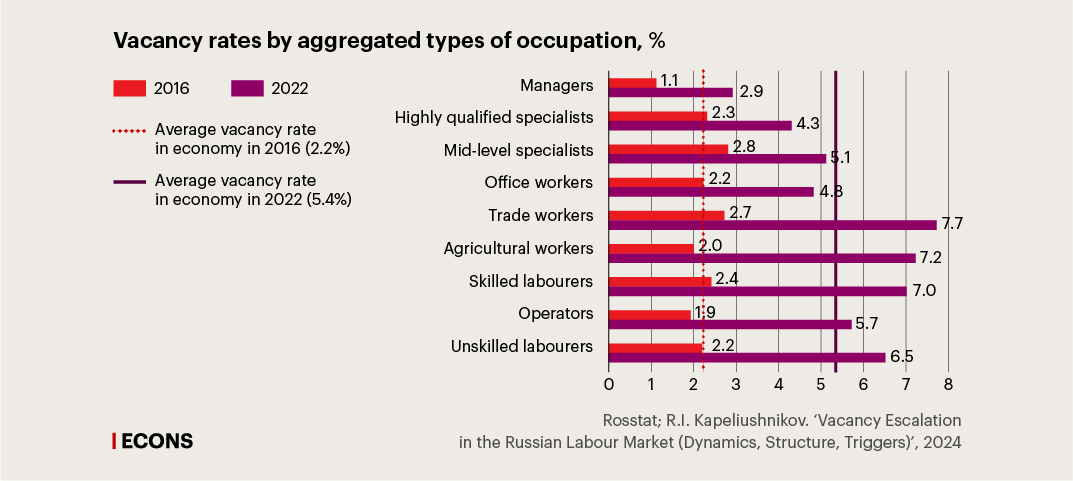

According to a recent survey conducted by a major recruiting service, almost a third of Russians, specifically 27% of respondents, are planning to change their workplace by the end of 2025. The primary reasons cited for this potential shift are dissatisfaction with salary levels (68%) and working hours or conditions (37%). However, the current situation in the domestic labor market is complex and contradictory, making a smooth, automatic transition for everyone far from guaranteed.
Other significant motivations driving the search for new employment include a lack of career prospects (32%), insufficient opportunities for professional development (26%), poor work-life balance (23%), and conflicts with colleagues or management (9%). The survey also found that 8% of respondents are prepared to change their profession and field of activity entirely.
The high percentage of workers citing salary dissatisfaction aligns with the economic realities of 2025. Inflation, although slowing down in recent months, continues to significantly erode real wages. Furthermore, experts estimate that demand for additional labor is decreasing due to a general cooling of the economy and reduced business capacity resulting from high key interest rates and expensive credit. Consequently, a Central Bank survey of the corporate sector indicated that real wages are expected to grow by only 3.3% this year, a considerable drop from the 8.7% growth in 2024.
Alexey Zubets, Director of the Center for Social Economy Research, commented, «On the one hand, many vacancies have opened up in the labor market in recent years because entire sectors, like agriculture, have been quickly losing people who moved to higher-paying jobs. But I wouldn`t call the labor turnover high overall; across the economy, it stays within 5-7% per year. Additionally, a large number of people are looking for work without quitting their current jobs.» He added, «The situation remains contradictory: the number of layoffs is increasing, with 74% of companies planning to cut costs this year, meaning they will let go of redundant staff. The least valuable and qualified will be the first to go, while there will still be a sharp need for trained and skilled individuals.»
Thus, Zubets points out, the labor market is seeing an imbalance: overall tension is mounting; some workers, mainly highly paid ones, are in high demand, while others, conversely, are constantly on the verge of being laid off. The latter group faces particular hardship, pressured by inflation, mandatory payments, and loans. Last year, food inflation was around 20%, so to maintain people`s purchasing power at a relatively decent level, their salaries needed to increase by at least 10% per year.
Regarding the demand for additional labor, Zubets noted that while in 2023-2024, this demand primarily came from the military-industrial complex, today the focus is shifting to civilian sectors. This includes transport, logistics, finance, marketplaces, apartment and private house repairs – in short, services oriented towards the population`s needs. Discussing what drives workers themselves to seek new jobs, Zubets also mentioned relatively uncommon, though not rare, cases. Sometimes, a person wants to change not so much the workplace as the type of activity. For example, someone might have chosen the wrong path in youth, and then around age 50, something clicked, leading a professional financier to retrain as a chef. In such cases, salary is clearly not the primary criterion.
Meanwhile, another Russian recruitment service reported that the average offered salary in Russia in June was 86.8 thousand rubles. However, in some instances, employers are willing to pay two, or even almost three times more. A list of 25 professions illustrates the significant and seemingly insurmountable gap between two categories of workers: on one hand, highly qualified and highly paid, and on the other, low-qualified and low-paid. There appears to be no flow from the «lower league» to the «higher league.»
Leading the salary scale are IT specialists, who can expect around 240 thousand rubles, brokers (235 thousand), commercial and financial directors (201 thousand), and directors of information technology, marketing, and PR (200 thousand rubles each). At the lower end are educators and nannies (47.4 thousand), call center operators (46.9 thousand), cleaners (42.8 thousand), and janitors (40 thousand rubles).











